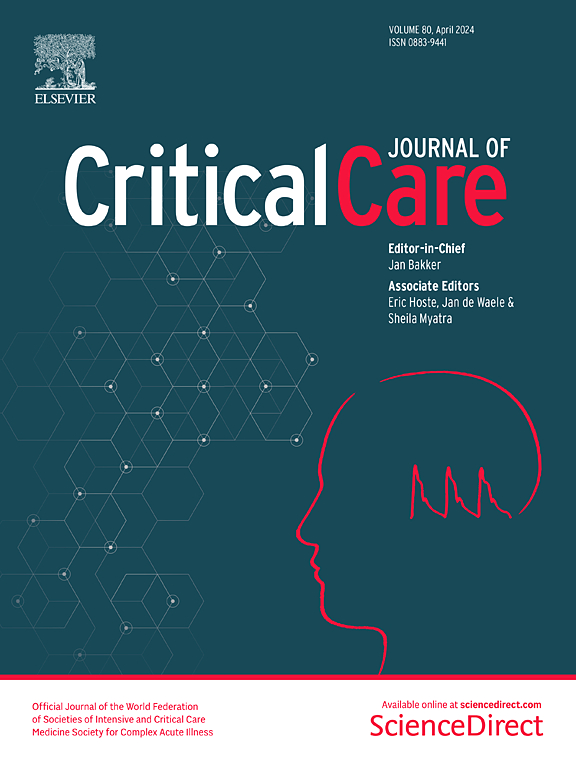The effects of extracorporeal blood purification (oXiris®) in patients with cardiogenic shock who require VA-ECMO (CLEAN ECMO): a prospective, open-label, randomized controlled pilot study
IF 8.8
1区 医学
Q1 CRITICAL CARE MEDICINE
引用次数: 0
Abstract
A systemic inflammatory response can contribute to poor outcomes in an advanced stage of cardiogenic shock (CS). We investigated the efficacy of extracorporeal endotoxin and cytokine adsorption using oXiris in patients with CS undergoing venoarterial extracorporeal membrane oxygenation (VA-ECMO). In this prospective, single-center, randomized, open-label pilot trial, 40 patients with CS who were undergoing VA-ECMO were randomly assigned to receive either oXiris for 24 h (n = 20) or usual care (n = 20). The primary endpoint was endotoxin levels at 48 h. Secondary endpoints included changes in inflammatory cytokines, vasoactive-inotropic score (VIS), ECMO weaning success, and in-hospital and 30-day mortality. The median endotoxin levels at 48 h were 0.5 (IQR 0.4–1.0) in the oXiris group and 0.4 (IQR 0.2–0.5) in the control group, with no significant difference between them (P = 0.097). The oXiris group showed significant temporal reductions in GDF-15 and IL-6 levels, with IL-6 revealing significant reductions from baseline to 24 h (P = 0.020) and from baseline to 7 days (P = 0.003). VIS decreased significantly from baseline to 48 h (-13.63, 95% CI: -20.90 – -6.34, P < 0.001) and 7 days (-12.19, 95% CI: -21.0 – -3.31, P = 0.007) in the oXiris group, but intergroup differences were insignificant. ECMO weaning success, duration of ECMO support, and mortality rates were similar between the groups. In this pilot study conducted on CS patients requiring VA-ECMO, oXiris treatment did not significantly reduce endotoxin levels or improve patient centered clinical outcomes. NCT05642273, registered 8 December 2022.体外血液净化(oXiris®)对需要VA-ECMO (CLEAN ECMO)的心源性休克患者的影响:一项前瞻性、开放标签、随机对照的试点研究
在心源性休克(CS)晚期,全身性炎症反应可能导致预后不良。我们研究了oXiris在行静脉动脉体外膜氧合(VA-ECMO)的CS患者中体外内毒素和细胞因子吸附的效果。在这项前瞻性、单中心、随机、开放标签的试点试验中,40名接受VA-ECMO的CS患者被随机分配接受oXiris治疗24小时(n = 20)或常规治疗(n = 20)。主要终点是48小时的内毒素水平。次要终点包括炎症细胞因子的变化、血管活性-肌力评分(VIS)、ECMO断奶成功率、住院死亡率和30天死亡率。oXiris组48 h内毒素水平中位数为0.5 (IQR 0.4 ~ 1.0),对照组为0.4 (IQR 0.2 ~ 0.5),两组间差异无统计学意义(P = 0.097)。oXiris组GDF-15和IL-6水平在时间上显著降低,IL-6从基线到24小时(P = 0.020)和从基线到7天(P = 0.003)显著降低。oXiris组VIS从基线到48 h (-13.63, 95% CI: -20.90 ~ -6.34, P < 0.001)和7 d (-12.19, 95% CI: -21.0 ~ -3.31, P = 0.007)显著下降,但组间差异不显著。两组间ECMO脱机成功率、ECMO支持持续时间和死亡率相似。在这项对需要VA-ECMO的CS患者进行的初步研究中,oXiris治疗并没有显著降低内毒素水平或改善以患者为中心的临床结果。NCT05642273,注册于2022年12月8日。
本文章由计算机程序翻译,如有差异,请以英文原文为准。
求助全文
约1分钟内获得全文
求助全文
来源期刊

Critical Care
医学-危重病医学
CiteScore
20.60
自引率
3.30%
发文量
348
审稿时长
1.5 months
期刊介绍:
Critical Care is an esteemed international medical journal that undergoes a rigorous peer-review process to maintain its high quality standards. Its primary objective is to enhance the healthcare services offered to critically ill patients. To achieve this, the journal focuses on gathering, exchanging, disseminating, and endorsing evidence-based information that is highly relevant to intensivists. By doing so, Critical Care seeks to provide a thorough and inclusive examination of the intensive care field.
 求助内容:
求助内容: 应助结果提醒方式:
应助结果提醒方式:


